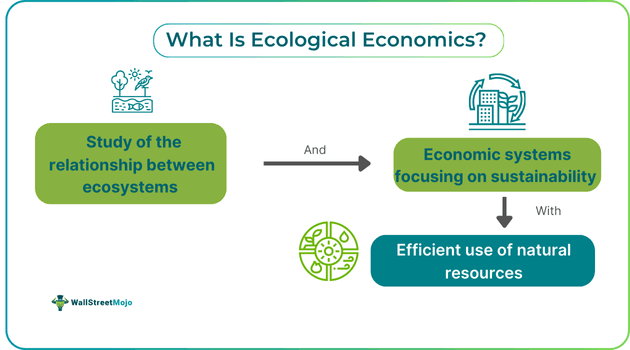Table of Contents
Ecological Economics Definition
Ecological economics is the study of economics that considers ecological aspects and all external market elements. It includes the existence of an ecosystem and finite resources and hence acknowledges the relationship between ecosystems and economic systems in a broad manner.

Ecological economics can be considered a subdiscipline of conventional economics. In summary, ecological economics believes that the environment and ecosystems cannot be treated as a simple factor of production and excluded from the whole economic equation. Every ecosystem has its impact and influence on the economy and plays a vital role in defining it, such as overfishing, carbon emissions, species extinction, deforestation, and so on.
Key Takeaways
- Ecological economics is the study of ecological factors that are treated as externalities and mere factors of production, not included in the assessment of conventional economics.
- Herman Daly is called the father of ecological economics; he is an American ecological and Georgian economist.
- He was also a professor at the School of Public Policy of the University of Maryland.
- World ecologists and economists tend to understand and recognize local and global environmental limits and argue over the impact of deforestation, overfishing, carbon emission, and other factors.
- It is essential to understand the social, political, economic, and ethical impact of different operations, practices, and activities around the world to set new environmental policies.
Ecological Economics Explained
Ecological economics is a fusion of both ecology and economics. It states that the human economy is part of the natural environment and ecosystems. Conventional economics only treats nature as a simple factor of production. Still, ecological economics defies it by stating that a nation's economy is embedded in natural systems and resources, and nature itself is the foundation of economic activities. Herman Daly is known as the father of ecological economics; he was an American ecologist and Georgia economist who taught at the School of Public Policy at the University of Maryland. He was also known for serving as the senior economist at the World Bank.
Many ecological economists study to prepare and present scientific arguments for preserving nature and the environment. The concept successfully recognizes the local and global environmental limits along with global issues such as species extinction, deforestation, carbon emission, overfishing, and so on. The whole field is centered around sustainability and development, not focusing on efficiency and growth. It encourages the comparison of pessimistic policies with alternative optimistic policies to reduce uncertainty about the real state of the world.
In simple terms, it states that nature and ecosystems can not be exploited for economic generation. Hence, different models are prepared to encompass production, consumption, and optimum resource use, keeping in mind the ethical, social, and ecological dimensions along with their market consequences.
Examples
Below are two examples to understand the concept better.
Example #1
Imagine a small town surrounded by a lake and a dense forest, with a couple of factories located on the outskirts. In conventional economics, the town is viewed primarily as a source of production, where resources from the forest and lake are utilized, factories generate profit, and the town contributes to the broader economy.
However, from an ecological economics perspective, this view still needs to be completed. Over time, deforestation and overfishing reduce the availability of critical resources. Additionally, the factories emit high levels of carbon, leading to air and water pollution. The eventual depletion of natural resources and species extinction threatens both the ecosystem and the long-term sustainability of the town's economy.
This example illustrates how ecosystems and natural resources are more than just inputs for production—they provide essential services and have a direct impact on economic health and sustainability.
Example #2
In a study related to ecological economics, researchers at the University of Montana observed that children from low-income households are more exposed to wildfire smoke. These children often do not have the same resources wealthier families have to access clean air. The study analyzed how often people visited city parks during smoke events by comparing cell phone usage in parks on both clear and smoky days across multiple cities, including Missoula.
The study noted that families in wealthier neighborhoods reduced park visits by up to 40% on moderately smoky days, while attendance in parks from lower-income areas remained largely unchanged. Researchers suggested that families with more spacious homes found it easier to keep their children indoors. At the same time, another study cited that it costs about $52 a day to keep kids indoors in clean-air environments. This highlights how the economic constraints of poorer families increase exposure to harmful air, demonstrating how environmental factors, like wildfire smoke, affect communities differently and should be considered in ecological economics.
Ecological Economics Vs. Environmental Economics Vs. Neoclassical Economics
The critical differences between ecological, environmental, and neoclassical economics are -
- Ecological economics defines natural systems and the impact of ecosystems on economies. Environmental economics is the study of cost allocation and conservation of natural resources, but Neoclassical economics acknowledges the consumer's perception of a product's value rather than its production cost.
- Ecological economics was introduced in 1988, but environmental economics emerged in the 1960s. In contrast, neoclassical economics, which competes with classical economics theories, dates back to the 1900s.
- Ecological economics focuses on the impact and importance of natural systems and activities such as deforestation and carbon emissions. In comparison, environmental economics focuses on the protection of natural resources. Still, neoclassical economics only focuses on studying consumer behavior in the market along with market forces that define supply and demand.
